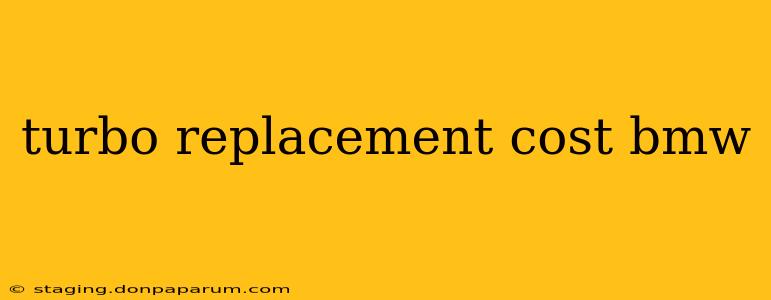Replacing a turbocharger on your BMW can be a significant expense, but understanding the factors influencing the cost is crucial for budgeting and planning. This guide breaks down the different aspects contributing to the overall price, helping you navigate this potential repair.
Factors Affecting BMW Turbo Replacement Cost
Several factors influence the final cost of a BMW turbocharger replacement. These include:
1. BMW Model and Year:
The specific BMW model and year significantly impact the cost. Older models might have readily available, cheaper aftermarket turbochargers, while newer models may require more expensive, original equipment manufacturer (OEM) parts. The complexity of the engine and its accessibility also play a role. A turbo replacement on a modern, complex engine will naturally cost more than on an older, simpler design.
2. Turbocharger Type and Source:
The type of turbocharger needed (e.g., twin-scroll, variable geometry) directly impacts the price. OEM parts are generally more expensive than aftermarket options, but they often offer superior reliability and longevity. Aftermarket turbos range widely in quality and price, so it's essential to choose a reputable supplier. Choosing a cheap, low-quality aftermarket part can result in premature failure and additional repair costs down the line.
3. Labor Costs:
Labor costs vary drastically depending on your location and the chosen mechanic. Specialized BMW mechanics often charge a higher hourly rate than general auto repair shops. The complexity of the turbocharger replacement itself (engine access, disassembly, etc.) also affects the labor time. Expect a higher labor cost for complex installations compared to simpler ones.
4. Associated Repairs:
Turbocharger failure can sometimes indicate other underlying problems. During the replacement process, mechanics might discover additional issues, such as oil leaks, damaged intake components, or clogged intercooler systems. Addressing these secondary problems will inevitably increase the total repair cost.
5. Additional Parts:
Besides the turbocharger itself, you might need additional parts such as gaskets, seals, oil lines, and sensors. These are often necessary for a complete and proper repair. Overlooking these smaller parts can result in further problems down the road.
Estimating the Cost: A Range of Possibilities
It's difficult to provide an exact cost without knowing your specific BMW model, year, and the specific circumstances of the turbo failure. However, a general range can be estimated:
-
Lower End: A less complex replacement on an older model using an aftermarket turbocharger might cost between $1,500 and $3,000. This estimate is at the lower end of the spectrum and assumes minimal additional repairs.
-
Mid-Range: For most BMW models and with the use of a reputable aftermarket turbo, the cost will usually fall between $3,000 and $6,000. This reflects the average cost including labor and potentially some minor associated repairs.
-
Higher End: Using OEM parts, dealing with a newer, more complex engine, or encountering extensive additional repairs can push the cost significantly higher, potentially reaching $6,000 or more.
Finding a Reputable Mechanic
Choosing a reputable mechanic specializing in BMW repair is crucial for a successful and cost-effective turbocharger replacement. Check reviews, ask for recommendations, and clarify all costs upfront before agreeing to any work.
Conclusion
Replacing a turbocharger on a BMW is a significant investment, but by understanding the factors affecting the cost, you can budget more accurately and make informed decisions. Choosing the right parts, selecting a qualified mechanic, and being aware of the potential for associated repairs will help you manage the overall expense effectively. Remember to always prioritize quality over immediate cost savings to ensure the long-term health and performance of your vehicle.

